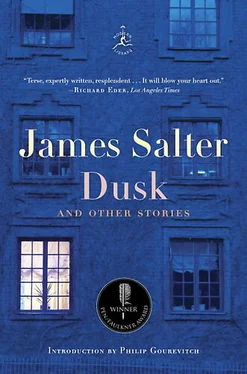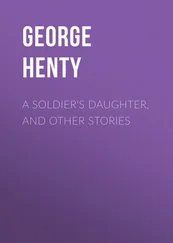What she actually felt after her boyfriend left, no one knew. She came in carrying the groceries, the screen door banged behind her. She answered the phone, took messages. In the evening she sat on the worn couch with Christopher watching television upstairs. Sometimes they both laughed. The shelves were piled with games, plastic toys, children’s books. Once in a while Christopher was told to bring one down so his mother could read him a story. It was very important that he like books, Gloria said.
It was a pale blue envelope with Arabic printing in the corner. Truus opened it standing at the kitchen counter and began to read the letter. The handwriting was childish and small. Dear Truus , it said. Thank you for your letter. I was glad to receive it. You don’t have to put so many stamps on letters to Saudi Arabia though. One U.S. airmail is enough. I’m glad to hear you miss me . She looked up. Christopher was banging on something in the doorway.
“This won’t work,” he said.
He was dragging a toy car that had to be pumped with air to run.
“Here, let me see,” she said. He seemed on the verge of tears. “This fits here, doesn’t it?” She attached the small plastic hose. “There, now it will work.”
“No, it won’t,” he said.
“No, it won’t,” she mimicked.
He watched gloomily as she pumped. When the handle grew stiff she put the car on the floor, pointed it, and let it go. It leapt across the room and crashed into the opposite wall. He went over and nudged it with his foot.
“Do you want to play with it?”
“No.”
“Then pick it up and put it away.”
“He didn’t move.
“Put… it… away…” she said, in a deep voice, coming toward him one step at a time. He watched from the corner of his eye. Another tottering step. “Or I eat you,” she growled.
He ran for the stairs shrieking. She continued to chant, shuffling slowly toward the stairs. The dog was barking. Gloria came in the door, reaching down to pull off her shoes and kick them to one side. “Hi, any calls?” she asked.
Truus abandoned her performance. “No. No one.”
Gloria had been visiting her mother, which was always tiresome. She looked around. Something was going on, she realized. “Where’s Christopher?”
A glint of blond hair appeared above the landing.
“Hello, darling,” she said. There was a pause. “Mummy said hello. What’s wrong? What’s happening?”
“We’re just playing a game,” Truus explained.
“Well, stop playing for a moment and come and kiss me.”
She took him into the living room. Truus went upstairs. Sometime later she heard her name being called. She folded the letter which she had read for the fifth or sixth time and went to the head of the stairs. “Yes?”
“Can you come down?” Gloria called. “He’s driving me crazy.
“He’s impossible,” she said, when Truus arrived. “He spilled his milk, he’s kicked over the dog water. Look at this mess!”
“Let’s go outside and play a game,” Truus said to him, reaching for his hand which he pulled away. “Come. Or do you want to go on the pony?”
He stared at the floor. As if she were alone in the room she got down on her hands and knees. She shook her hair loose and made a curious sound, a faint neigh, pure as the tinkle of glass. She turned to gaze indifferently at him over her shoulder. He was watching.
“Come,” she said calmly. “Your pony is waiting.”
After that when the letters arrived, Truus would fold them and slip them into her pocket while Gloria went through the mail: bills, gallery openings, urgent requests for payment, occasionally a letter. She wrote very few herself but always complained when she did not receive them. Comments on the logic of this only served to annoy her.
The fall was coming. Everything seemed to deny it. The days were still warm, the great, terminal sun poured down. The leaves, more luxuriant than ever, covered the trees. Behind the hedges, lawn mowers made a final racket. On the warm slate of the terrace, left behind, a grasshopper, a veteran in dark green and yellow, limped along. The birds had torn off one of his legs.
One morning Gloria was upstairs when something happened to catch her eye. The door to the little guest room was open and on the night table, folded, was a letter. It lay there in the silence, half of it raised like a wing in the air. The house was empty. Truus had gone to shop and pick up Christopher at nursery school. With the curiosity of a schoolgirl, Gloria sat down on the bed. She unfolded the envelope and took out the pages. The first thing her eye fell upon was a line just above the middle. It stunned her. For a moment she was dazed. She read the letter through nervously. She opened the drawer. There were others. She read them as well. Like love letters they were repetitious, but they were not love letters. He did more than work in an office, this man, much more. He went through Europe, city after city, looking for young people who in hotel rooms and cheap apartments—she was horrified by her images of it—stripped and were immersed in a river of sordid acts. The letters were like those of a high school boy, that was the most terrible part. They were letters of recruitment, so simple they might have been copied out by an illiterate.
Sitting there framed in the doorway, her hand nearly trembling, she could not think of what to do. She felt deeply upset, frightened, betrayed. She glanced out the window. She wondered if she should go immediately to the nursery school—she could be there in minutes—and take Christopher somewhere where he would be safe. No, that would be foolish. She hurried downstairs to the telephone.
“Ned,” she said when she reached him—her voice was shaking. She was looking at one of the letters which asked a number of matter-of-fact questions.
“What is it? Is anything wrong?”
“Come right away. I need you. Something’s happened.”
For a while then she stood there with the letters in her hand. Looking around hurriedly, she put them in a drawer where garden seeds were kept. She began to calculate how long it would be before he would be there, driving out from the city.
She heard them come in. She was in her bedroom. She had regained her composure, but as she entered the kitchen she could feel her heart beating wildly. Truus was preparing lunch.
“Mummy, look at this,” Christopher said. He held up a sheet of paper. “Do you see what this is?”
“Yes. It’s very nice.”
“This is the engine,” he said. “These are the wings. These are the guns.”
She tried to focus her attention on the scrawled outline with its garish colors, but she was conscious only of the girl at work behind the counter. As Truus brought the plates to the table, Gloria tried to look calmly at her face, a face she realized she had not seen before. In it she recognized for the first time depravity, and in Truus’ limbs, their smoothness, their volume, she saw brutality and vice. Outside, in the ordinary daylight, were the trees along the side of the property, the roof of a house, the lawn, some scattered toys. It was a landscape that seemed ominous, too idyllic, too still.
“Don’t use your fingers, Christopher,” Truus said, sitting down with him. “Use your fork.”
“It won’t reach,” he said.
She pushed the plate an inch or two toward him.
“Here, try now,” she said.
Later, watching them play outside on the grass, Gloria could not help noticing a wild, almost a bestial aspect in her son’s excitement, as if a crudeness were somehow becoming part of him, soiling him. A line from the many that lay writhing in her head came forth. I hope you will be ready to take my big cock when I see you again. P.S. Have you had any big cocks lately? I miss you and think of you and it makes me very hard . “Have you ever read anything like that?” Gloria asked.
Читать дальше












